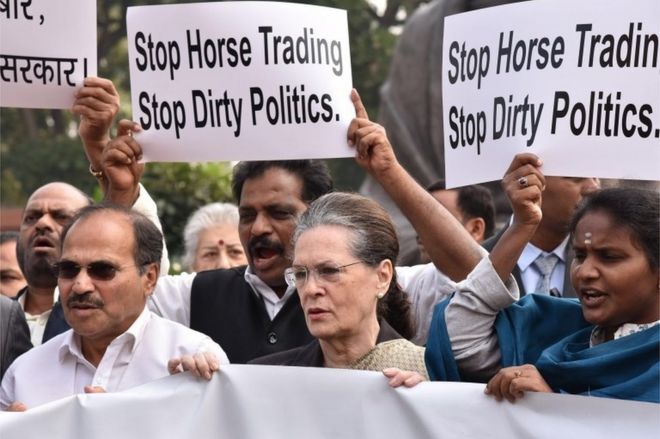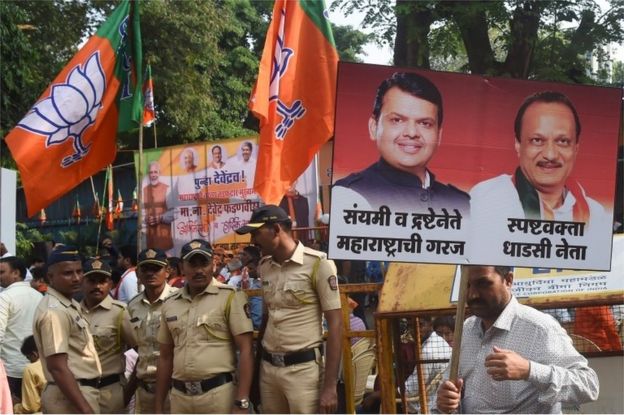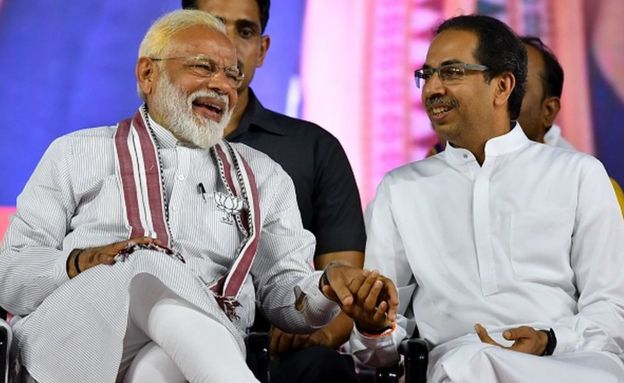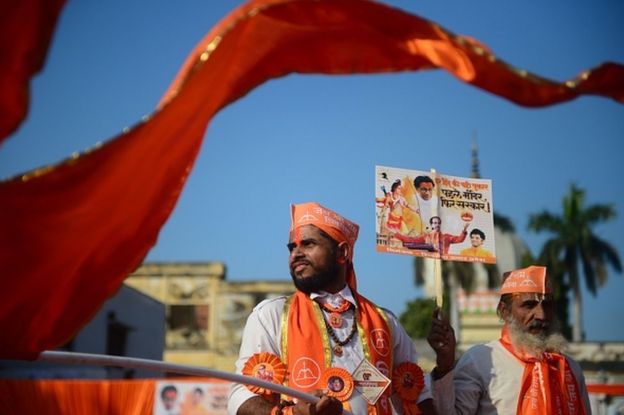ADVERTISEMENT
26 November 2019
 Image copyrightEPA
Image copyrightEPA
Maharashtra's chief minister, Devendra Fadnavis, has resigned just after three days in power. His departure came hours after India's Supreme Court ordered him to take a vote of confidence on Wednesday. What does the crisis tell us about Indian politics?
British publisher Ernest Benn once said politics was the "art of looking for trouble, finding it everywhere, diagnosing it incorrectly and applying unsuitable remedies".
Going by what is happening in Maharashtra, Benn's biting aphorism could apply both to the politics and institutions in the world's biggest democracy.
A fractious impasse over forming a government after closely-fought state elections in India's richest state - and home to Mumbai, its financial capital - has now snowballed into an unsavoury spectacle of competitive politics, sometimes bordering on the absurd.
The elections to the 288-seat state assembly were not unexceptional. The vote had split four ways. Narendra Modi's Hindu nationalist BJP emerged as the single largest party (105 seats); and its long-time ally, Shiv Sena, (56 seats) came in as the second largest. The two main opposition parties - the regional Nationalist Congress Party (NCP) and the Congress - picked up less than 100 seats between them.
Clearly, the BJP-Sena were comfortably expected to form the government. Except, things unravelled very quickly and the Sena walked out of the alliance after fighting over the spoils of power.
What followed was a sensational counter-alliance against the BJP making a power bid, a split in an influential political family, alleged defections and attempts to poach rival lawmakers, corralled in resorts by their skittish parties.
 Image copyrightAFP
Image copyrightAFP
An early morning political coup followed by a hasty swearing in of a BJP-led government and appeals in the Supreme Court for a speedy vote of confidence completed this political soap opera. News networks who have reduced politics to Bollywood-like entertainment are gleefully crowing that the "movie isn't finished yet".
Political alliances breaking up after elections is not uncommon. Post-election alliances to gain power are often time consuming. A week is a long time in politics, and a month - as in the case of Maharashtra - more so, and the impatience of the party with most seats in trying to cobble together a governing alliance is also not unknown.
What, many believe, is surprising this time is the way the governor of a state - whose job is to designate the chief minister - hastily swore in the BJP with a new-found ally, who had defected from the opposition camp. (The government was sworn in early on Saturday morning.)
 Image copyrightAFP
Image copyrightAFP
Political scientist Suhas Palshikar says the first "institution to fall was the governor's office". A landmark 1994 judgement by the top court makes it very clear that the majority of a government is subject to a floor test in the house, and the governor has no role in such a scenario.
"Why within the early hours of the morning was that claim [by the BJP] accepted and acted upon? To complete the circle of institutional abdication, the [supreme] court, instead of following the precedent of imposing a stiff deadline for a floor test, chose to defer the hearing from Sunday to Monday to Tuesday," says Dr Palshikar. The implication is all this obviously benefitted the BJP, which rules India.
What has happened in Maharashtra is mostly about why many Indians increasingly despair about their democracy: a kind of gaudy go-for-broke politics marked by bald-faced opportunism, fluid ideologies, brazen skulduggery and buying of lawmakers. They worry about fraying, partisan institutions - the Election Commission and the courts, for example - which, they believe, appear to be working under pressure from the executive.
 Image copyrightGETTY IMAGES
Image copyrightGETTY IMAGES
Why is there not enough public outrage about the developments in Maharashtra?
One reason could be that many Indians have become inured to such brazen displays of political opportunism and institutional fickleness.
Another reason could be that politics of mass protest appears to have hit a nadir. India has not experienced any mass mobilisation of the likes of recent global climate change protests, or the pro-democracy outpouring in Hong Kong. Young Indians seem to be disinterested in politics, and only the BJP appears to have the money and resources to mobilise supporters. And glorification of such politics could have to do with a yearning for tough, can-do politics - in 2017, a majority of Indians polled by Pew Global said they preferred a governing system "in which a strong leader can make decisions without interference from parliament or the courts".
Whatever it is, the developments in Maharashtra, says Dr Palshikar, have "done durable damage to the idea of competitive politics". This happens when "all round failure of politics takes place and is coupled with institutional abdication and chicanery".
https://www.codella.biz/
|

Related Topics
India

India Supreme Court says world 'laughing' at smog
- 25 November 2019
- From the sectionIndia

Indian doctors remove 7.4kg kidney from patient
- 26 November 2019
- From the sectionIndia

'Indian food is terrible' tweet sparks hot debate
- 25 November 2019
- From the sectionUS & Canada
Top Stories
Falsely convicted US trio freed after 36 years
The men were teenagers in 1984 when they were jailed for life for killing a boy in Maryland.
5 hours ago
Resignations spark Malta crisis in murder scandal
2 hours ago
Rescuers search into the night after Albania quake
36 minutes ago
Features
Elsewhere on the BBC
Most Read
- 1Katie Price declared bankrupt at High Court
- 2Jo Swinson wins court bid to stop SNP 'fracking' leaflet
- 3Yorkshire Air Ambulance withdraws Prince Andrew connection
- 4Sukiyabashi Jiro, exclusive sushi restaurant, is dropped by Michelin
- 5General election 2019: No apology from Jeremy Corbyn over Labour anti-Semitism claims
- 6Teen's TikTok video about China's Muslim camps goes viral
- 7EuroMillions jackpot of £105m claimed by Selsey couple
- 8Maryland trio set free after being wrongfully jailed for 36 years
- 9General election 2019: Latest from the election campaign trail
- 10Tottenham 4-2 Olympiakos: Spurs fight back in Jose Mourinho home debut











No comments:
Post a Comment